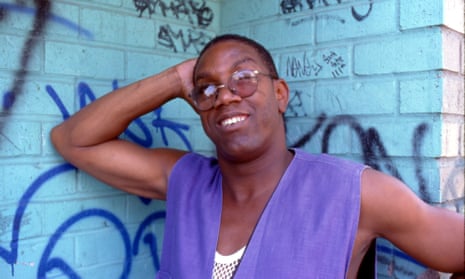The singer Frankie Paul, who has died aged 51 of complications related to kidney failure, was a leading light in reggae music during the 1980s and 90s. He was one of the key figures in the movement away from Rasta-influenced roots reggae to the new ascendancy of less spiritual but hugely popular dancehall music, becoming a prolific recording artist with dozens of albums to his name and a global profile enhanced by touring.
Paul’s rich tone and impressive vocal range would have graced any style of reggae music, but time and place dictated that he stood in the vanguard of an 80s dancehall revolution that essentially ditched roots reggae’s interest in social, political or religious matters and turned instead to more down-to-earth or downright frivolous topics.
Some of Paul’s popular and gently humorous tunes reflected that shift – his 1987 hit song Alesha, for instance, about an overweight lover of fast food, featured the oft-quoted line “all she feed ‘pon is french fry and hamburger”. Many of his other compositions, such as Sindie (1985) and Casanova (1988), were alluring but uncomplicated love songs.

That said, even the greatest detractors of the new dancehall trends found it difficult to object to Paul’s many obvious musical qualities, which stood in contrast to the thin talents of some other artists of the period, many of whom quickly began to focus on singing about guns, crime and sexual “slackness”. Paul maintained that “dancehall music has always been about life and fun”, but his view on the subject was perhaps more of a reflection of his own outlook than some of those around him.
He was born Paul Blake in Kingston, Jamaica. His father died when he was very young; his mother, Grace Kerr, a street trader, later married Lloyd Clarke, an electrician. Blind at birth – although an operation later gave him some sight and special glasses provided another marginal improvement – Paul attended a Salvation Army school for the blind in Kingston, where he learned to play the drums, piano and guitar. At school he sang for his hero, Stevie Wonder, when the American star made a visit in 1975. Wonder was impressed, and urged him to think about a career in music.
In 1980, at the age of 15, he made his first recording under the stage name Frankie Paul, with a single called African Princess that was rootsy both in style and subject matter. By 1983 hints of a new outlook had emerged when he was featured as an emerging talent on one side of a Channel One “clash” album that pitted him against the already well-established Sugar Minott, each artist offering some of their latest songs.
That record worked wonders for his reputation, and during the following two years he made big breakthroughs with the singles Worries in the Dance (1983), which dealt with the violent undercurrent of Jamaican dancehalls, Fire Deh a Mus Mus Tail (1984), centred on an old Jamaican proverb, and Pass the Tu-Sheng-Peng (1984), a celebration of ganja. All were hits in Jamaica and beyond, and remain in the pantheon of reggae classics.
For the next decade he was at the heart of the dancehall scene and its computerised rhythms, working with various labels (including London’s Greensleeves) and with all the best Jamaican producers of the era, including Henry “Junjo” Lawes and Philip “Fatis” Burrell, as well as world-renowned artists such as Sly and Robbie. Although he released a huge number of records over the period – several albums a year for a time – for the most part he managed to maintain some form of quality control, even if later he increasingly sought refuge in cover versions.
From the mid 90s onwards, Paul largely lived in the Gambia, where he had made a home after performing there. He was dogged by ill health in the last few years of his life and had returned to Jamaica before his death. Kidney problems meant he had to have expensive dialysis treatment, which left him in financial difficulty, and he had his right leg amputated in 2016. His last public performance came that year in Jamaica and he released an album, Frankie Paul Sings Dennis Brown, early this year.
He is survived by six children and four grandchildren, and by six sisters and three brothers.

Comments (…)
Sign in or create your Guardian account to join the discussion